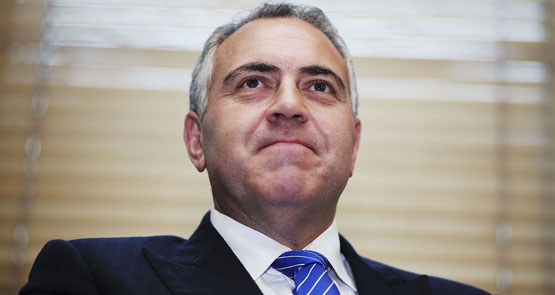
Federal Treasurer Joe Hockey says raising Australia’s debt ceiling from $300 billion to $500 billion will stave off a United States-style debt crisis. After the government announced it would introduce legislation to raise the debt ceiling, the Labor opposition offered a compromise of a rise to $400 billion. Hockey says that’s inadequate, and matters are coming to a head as the government introduces legislation to Parliament today.
So what are the consequences of raising the debt ceiling in Australia and what should it be raised to? Crikey asks the economists — who think much of the debate on this issue is a beat-up …
Economics professor Steve Keen, University of Western Sydney:
We should be raising the debt ceiling. It’s sensible for the government to borrow money to finance part of expenditure, particularly if that involves infrastructure and development, which we’ve let wane badly in the last 20 years.
Putting a number on what we should raise the debt ceiling to is a bit like saying how many cards should there be in a playing deck. The government can issue as much money as it likes. The fact we have a numerical debt ceiling rather than one related to GDP is silly. There’s no real point where a government that issues its own currency has a debt ceiling, but if we have one it should be related to GDP rather than an absolute number, and it should be at least five times what it currently is.
It’s insane to worry about the government debt. The level of government debt is less than Australian credit card debt. There’s been a total beat-up of the debate in the last three years.
Michael Knox, chief economist and director of strategy at Morgans:
Australia should raise its debt ceiling. We have around about four years before we get back to balancing the budget, so we need to borrow more money and we also need to finance the existing stock of debt which we have.
The amount by which the debt ceiling is raised shouldn’t be an issue. You’ve got the side of politics that wants to increase the debt ceiling and say they want to move towards a balanced budget in four years. Unless the other side wants to move towards a balanced budget earlier, there’s no rational reason not to increase the debt ceiling.
I can understand why this might happen in the US context, but I can’t understand why it is happening in the Australian context. The side of politics in the US that tried to limit the debt ceiling has done it in order to reduce government spending. In Australia you’ve got the side of politics that usually wants to increase spending trying to limit the increase of the debt ceiling. It’s inherently contradictory.
Dr Frank Gelber, chief economist at BIS Shrapnel:
This is a non-issue. We need to raise the debt ceiling. Now it’s in the political arena. The question is by how much. Do you raise it by $200 billion, or do you raise it by a little less so you have to discuss it again sooner?
I don’t have an opinion on how much the debt ceiling should be raised by, but we’re going to need the $500 billion eventually. The debt ceiling will be raised, 100 [billion] gives them years to raise it again if they need. The question is whether you have to justify every incremental raise. In practical terms I don’t think it’s going to make a big difference to our credit rating.








The Coalition beat up public debt in opposition under Howard and again under Abbott so it is understandable if regrettable that Labor should seek to score this political point.
Agree Gavin, but this motley crew won an election by telling everyone that the Labor party were hopeless economic managers, borrowed too much and our grandchildren would be paying back ‘Labor’s debt’ for ever more.
Don’t you think they have some explaining to do? It is too easy to just laugh it off as ‘good political tactics’. And it is patently dishonest as well.
Who the hell is going to keep this lot accountable? Certainly not the MSM. Or the new speaker, if this morning’s episode is anything to go by. An outrageous performance by the silly old chook!
I believe that what the Japan’s monetary easing policy is doing to push the YEN downwards healthily is an appropriate action for the Australian government to consider. In a layman term, just print more money to make the currency move downwards peacefully.
Since the YEN is much cheaper than before, the export and tourism businesses from Japan are active again. This is exactly what we want to see.
Also, if the A$ depreciate, it will show an improvement of our government’s overseas investments which are usually calculated in foreign currencies.
Before A$ starts to depreciate, it should be a good idea for investors in Australia to rapidly purchase some overseas assets e.g. a supermarket chain in Hong Kong or some businesses in China or other parts of Asia.
Why is we only have to worry about “Labor debt”?
We all remember Steve Keen’s dire prediction on housing years ago. I cannot take him seriously.